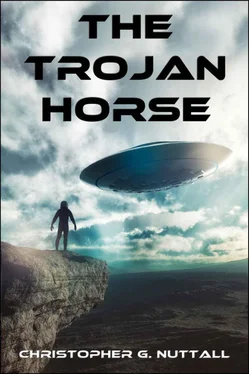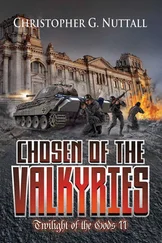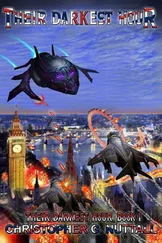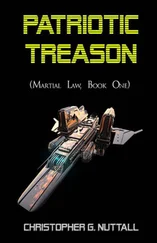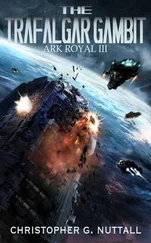“Interesting,” the writer said. “Does that mean that the Federation doesn’t fight wars?”
This time, there was a very long pause. “The Federation has not fought a war in generations,” the alien said. “We do not need to fight when the benefits of cooperation are so clear to almost every race. There is an unlimited bounty of resources out among the stars, enough for everyone. Your race worries us because you may prove dangerous to others.”
The subject changed rapidly. “As you are aware, we have already started distributing fusion generators to your nations,” the alien said. “These generators produce enough power to handle all of your projected energy requirements for the next four decades before they will need to be refuelled. By then, we expect that you will have made the switch to a fusion-based economy and started cleaning up your homeworld…”
Jason sighed and settled back in his chair. At least they’d learned something about the aliens, if only that they were clearly reluctant to share certain kinds of data with Earth. And that puzzled him. He could have understood the aliens refusing to share designs for weapons — they would have made humanity much more dangerous — but surely information on the Federation’s member races couldn’t be harmful. The human race had had nearly two weeks to get used to the concept that they were surrounded by thousands of other intelligent races. They surely could handle seeing visual depictions of other aliens; what were they — Cthulhu?
“I have another question,” the science-fiction writer said. “How is the Federation actually governed?”
The alien seemed to hesitate again, before answering. “The Federation is organised along democratic lines, with each race being given a vote in the government,” he said. “Our government is run by consensus, with all proposed laws requiring a majority vote to pass into law. Each race has internal autonomy within the Federation, but is expected to respect other races while in space…”
Jason jumped in, quickly. “So there’s no shared sense of ethics…?”
Oddly, the alien didn’t seem to mind the question. “You must understand that different races have different ways of living,” he said. “We have races that have one intelligent sex and one unintelligent sex. Those races do not have any concept of equality between the sexes — and why should they? Other races are telepathic, capable of operating a perfect democracy; they have little need for the complex governments designed by less capable societies. There are races that breed in manners that would sicken you — and races that regard the human interest in sexual acts as barbaric. Any attempt to force a united code of conduct on the Federation would result in disaster.”
He looked around the room. “As I was saying, the importance of fusion power…”
* * *
Joseph Buckley had never hidden the fact that he’d served in the United States Navy during the early stages of the War on Terror, although he’d never seen anything reassembling real action. Indeed, he’d been discharged from the Navy in 2010 and had turned his service experience into a series of best-selling science-fiction novels. He’d invented his own science — a system involving a network of concentrated gravity streams, allowing transit from star to star — but he’d based the fictional space navies on his own experience in the USN. The critics had loved them and he’d become moderately wealthy. He’d even had a film planned out that had become stuck in development hell.
He’d been surprised when his application to visit one of the alien bases had been accepted so quickly. A series of telephone calls to various other writers he knew had revealed that the aliens seemed to be biased in favour of fantasy and fantasy-SF writers, and against those who took the care to develop universes in line with understandable scientific concepts. His puzzlement had deepened until he’d realised that a woman who wrote trashy romantic fiction about a young teenage girl who rode a giant unicorn from star to star would be unlikely to discover anything that might actually provide a clue to how the Galactics science actually worked. Writers with strong military or scientific backgrounds had been barred; writers who made up their own crap had been prioritised. One didn’t have to be Fox Mulder to get a sense that something was badly wrong.
After the alien presentation was finally finished — the only thing saving it from terminal boredom had been the presence of the alien himself — Joseph remained behind after the aliens escorted most of the humans out of the room, saying that he had to go to the washroom. The aliens accepted it, leaving him alone for long enough to allow him to take an unsupervised look around the chamber. In a bad novel or TV series, he would have discovered the secret plans at once. Instead, he found almost nothing. The chamber seemed to be little more than a movie set.
Puzzled, he slipped out of the door, purposefully choosing to head in the wrong direction from the tour group. Silently researching excuses in his head, he walked down the metal corridor, noting the strange proportions as he passed a handful of sealed doors. An attempt to open them resulted in nothing, apart from a sore hand. The alien locks seemed unbreakable — at least without revealing his presence. He was on the verge of giving up when he discovered a door that was half-open and slipped through it before he had a chance to think. The door slid closed behind him and he swore under his breath. There was no way to retreat back to the relative safety of the tour group.
He paused — and realised, for the first time, that the slightly unpleasant scent that seemed to accompany the aliens was noticeably stronger. The lighting, too, was different, seeming to blaze down on his bald skull. Nervously, wishing he’d been able to carry his handgun into the alien base, he kept walking down and paused at the corner, peering around into a vast chamber. Two aliens stood in front of him, their backs turned, studying a set of images that flickered in and out of existence in front of them. Some of the images seemed to be human television channels, others appeared to be jumpy, as if they were carried by an amateur cameraman. One of the aliens seemed to twist in a manner that reminded him of his grandfather’s pet snake, his sinuous neck snaking outwards towards a single set of displays. They showed a handful of humans within what looked like an operating facility…
Joseph must have gasped, for both aliens spun around with startling speed. It was already too late to retreat. He was still inching backwards when something stuck him in the back and he crashed down to the cold metal floor. The smell grew stronger as a third alien loomed over him, picked his paralysed body up with apparently effortless ease, and carried him down another corridor. His mind, already spinning under the influence of whatever they’d shot him with, started to blur; he spun in and out of awareness. A whole series of flickering images seemed to flash across his mind; an alien, looking down at him; something being extended towards his neck; a brief sense of almost intolerable pain…
And then everything seemed to fade away into nothingness.
* * *
Jason looked up as the science-fiction writer was escorted back into the chamber. “I just got lost,” he mumbled, as if he were drunk. “They pointed me back here.”
“Good for them,” one of the other visitors said. “Isn’t it lucky that they were here to help?”
Fort Meade, Maryland
USA, Day 17
“If you’ll follow me, sir…?”
Toby followed the NSA staffer with some irritation. The call to Fort Meade — the headquarters of the National Security Agency, responsible for intercepting enemy messages and protecting American communications security — had come out of the blue. It was true that he was overdue for a routine security check and lecture, but his life had been really quite alarmingly busy. Unlike many of the government staffers, Toby didn’t hold security in absolute contempt, yet it could be irritating at times. He was cleared for almost everything, after all.
Читать дальше
